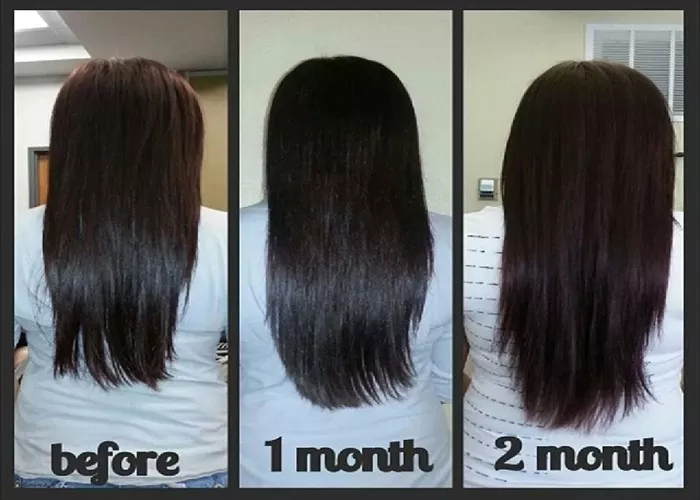Growing long hair quickly is a common goal for many people, but achieving it requires patience, proper care, and the right techniques. Hair typically grows about half an inch per month, but various factors—such as genetics, diet, and hair care habits—can influence growth speed. While you can’t drastically change your hair’s natural growth rate overnight, you can optimize conditions to encourage faster, healthier growth and minimize breakage. Here’s a comprehensive guide on how to get long hair fast.
Understanding Hair Growth and Its Phases
Before diving into hair growth strategies, it’s essential to understand how hair grows. Hair growth occurs in three main phases:
- Anagen (Growth Phase): This active phase lasts between 2 to 7 years, during which hair grows about half an inch per month. The longer this phase, the longer your hair can grow.
- Catagen (Transition Phase): A short 2-3 week phase where hair stops growing and detaches from the blood supply.
- Telogen (Resting Phase): Lasting about 3 months, this is when hair sheds naturally, making way for new growth.
Since you can’t speed up the anagen phase, the key to long hair lies in maintaining healthy hair, reducing breakage, and supporting growth through proper nutrition and care.
Nutrition for Faster Hair Growth
Your hair’s health starts from within. A nutrient-rich diet ensures that hair follicles receive the vitamins and minerals needed for optimal growth. Key nutrients include:
- Protein: Hair is made of keratin, a protein, so insufficient protein intake can lead to weak, brittle hair. Include lean meats, eggs, beans, and dairy in your diet.
- Biotin (Vitamin B7): Known for promoting hair growth, biotin is found in eggs, nuts, and leafy greens. Supplements can help if you’re deficient.
- Iron: Low iron levels (anemia) can cause hair loss. Eat spinach, red meat, lentils, and fortified cereals.
- Omega-3 Fatty Acids: Found in fatty fish, flaxseeds, and walnuts, these fats support scalp health and reduce inflammation.
- Vitamins A, C, D, and E: These vitamins aid in sebum production, collagen formation, and antioxidant protection for hair follicles.
- Zinc and Selenium: Essential for hair tissue repair and growth, these minerals are found in oysters, pumpkin seeds, and Brazil nuts.
Staying hydrated is also crucial, as dehydration can make hair dry and prone to breakage.
Scalp Care for Optimal Hair Growth
A healthy scalp creates the perfect environment for hair growth. Poor scalp health can lead to dandruff, clogged follicles, and slower growth. Follow these tips:
- Regular Cleansing: Wash your hair 2-3 times a week with a sulfate-free shampoo to remove buildup without stripping natural oils.
- Scalp Massages: Massaging the scalp increases blood circulation, delivering more nutrients to hair follicles. Use fingertips (not nails) in circular motions for 5 minutes daily.
- Exfoliation: Use a gentle scalp scrub or a brush to remove dead skin cells and unclog follicles.
- Avoid Overwashing: Washing too often can strip natural oils, leading to dryness and breakage.
- Use Essential Oils: Rosemary, peppermint, and lavender oils have been shown to stimulate hair growth when diluted and massaged into the scalp.
Hair Care Practices to Prevent Breakage
Long hair isn’t just about growth—it’s about retaining length by preventing breakage. Common causes of breakage include heat styling, harsh brushing, and chemical treatments. Here’s how to protect your hair:
- Minimize Heat Styling: Excessive use of flat irons, curling wands, and blow dryers weakens hair. If you must use heat, apply a heat protectant and keep temperatures moderate.
- Gentle Detangling: Use a wide-tooth comb or a detangling brush, starting from the ends and working upward to avoid pulling.
- Avoid Tight Hairstyles: Ponytails, braids, and buns that pull on roots can cause traction alopecia. Opt for loose styles and silk scrunchies.
- Trim Regularly: While it may seem counterintuitive, trimming split ends every 8-12 weeks prevents them from traveling up the hair shaft and causing more damage.
- Deep Conditioning: Weekly deep conditioning treatments with protein or moisture-based masks strengthen hair and prevent breakage.
- Sleep on Silk/Satin: Cotton pillowcases cause friction, leading to breakage. Switch to silk or satin to reduce damage.
Supplements and Treatments to Boost Growth
If diet alone isn’t enough, certain supplements and treatments can support hair growth:
- Biotin Supplements: Often recommended for hair growth, but consult a doctor before starting.
- Collagen Peptides: Supports hair structure and may improve growth rate.
- Viviscal or Nutrafol: Clinically tested supplements containing marine extracts, vitamins, and minerals for hair growth.
- Red Light Therapy: Low-level laser therapy (LLLT) devices stimulate follicles and may increase growth speed.
- PRP (Platelet-Rich Plasma) Therapy: A dermatological treatment where your blood’s plasma is injected into the scalp to promote growth.
Avoiding Common Hair Growth Mistakes
Many people unknowingly sabotage their hair growth efforts. Avoid these mistakes:
- Overwashing or Using Harsh Shampoos: Strips natural oils, leading to dryness.
- Skipping Regular Trims: Split ends worsen over time, causing more breakage.
- Rubbing Hair with a Towel: Causes friction and breakage—pat dry instead.
- Using Too Many Styling Products: Heavy gels and sprays can clog follicles.
- Ignoring Stress: High stress levels can push hair into the telogen phase, causing shedding. Practice stress management techniques like yoga or meditation.
Conclusion
Growing long hair fast requires a combination of proper nutrition, scalp care, gentle hair practices, and patience. While you can’t change your genetics, optimizing your hair care routine will help you achieve the longest, healthiest hair possible. Stay consistent with these tips, and over time, you’ll notice stronger, longer locks. Remember, healthy hair growth is a journey—not an overnight miracle.
Related Topics:
How Do You Keep Hair Moisturized After Washing?
How to Get Smooth Hair in One Wash?
How Do You Protect Short Natural Hair While You Sleep?


